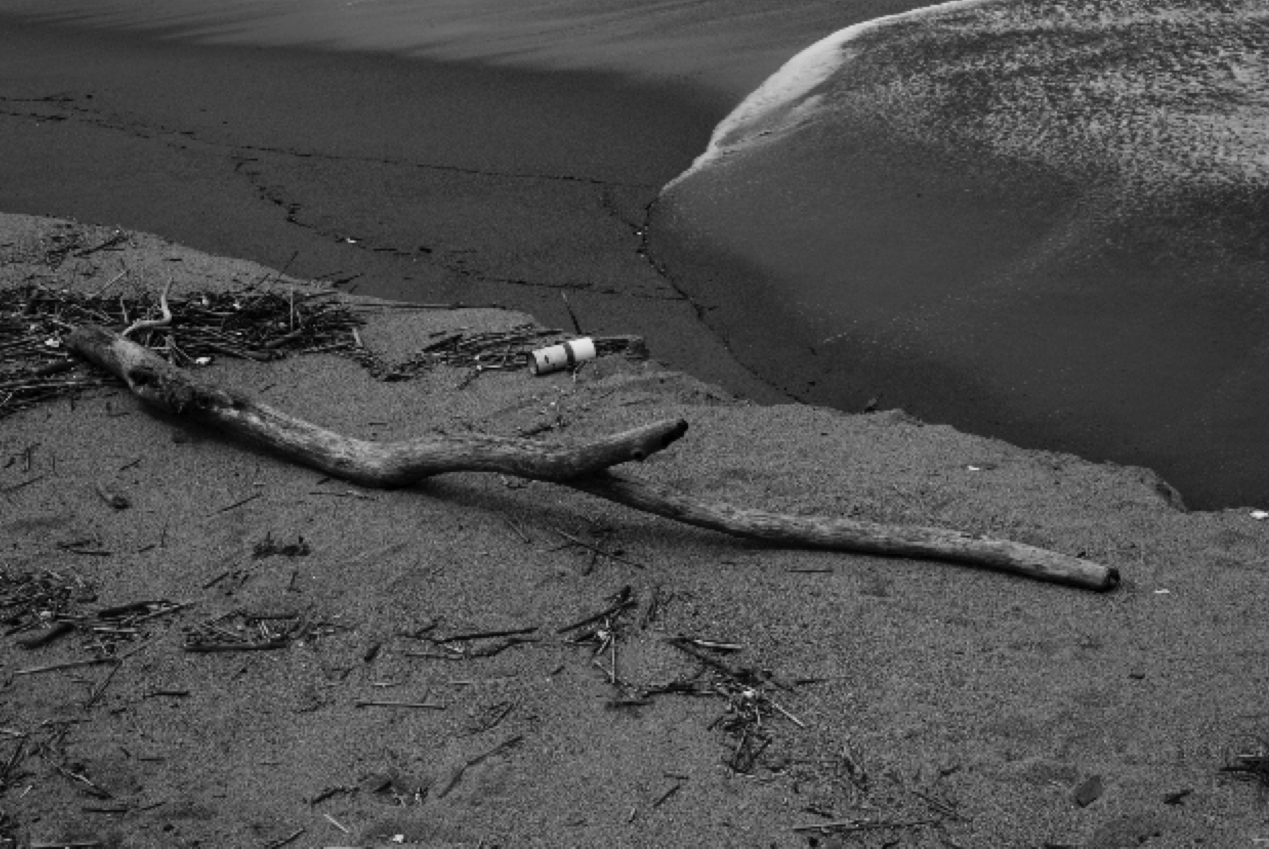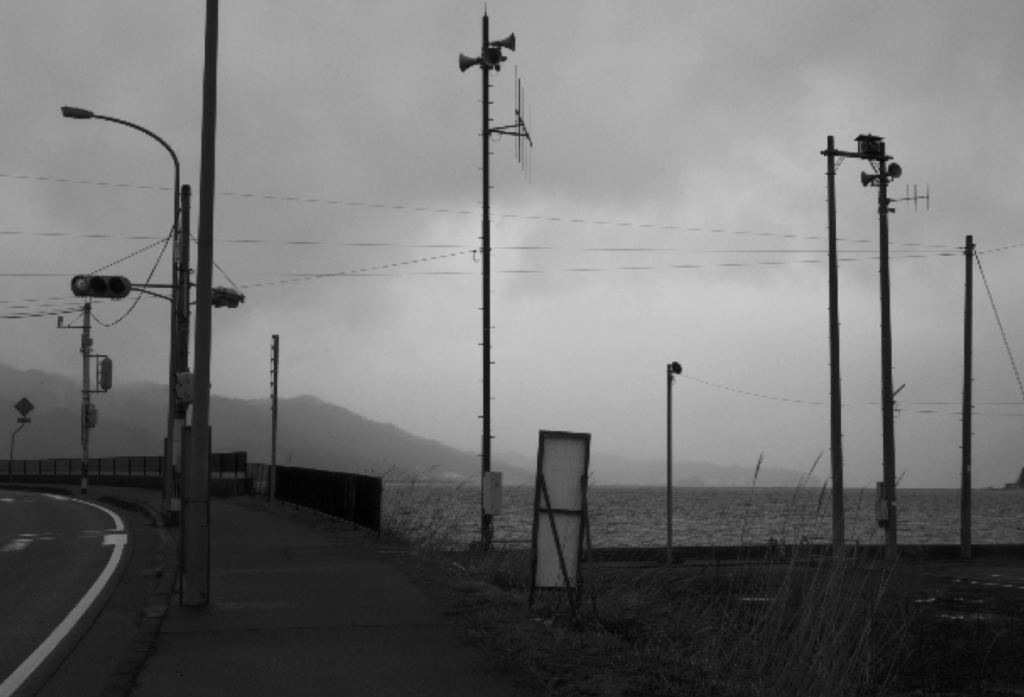“‘Found Poem’ is a text that tries to blur the borders between autofiction, the critical essay, and poetry. By examining misquotation and redrafting in detail — with successive drafts of ‘the same poem’ presented as a demonstration of these practices — the text opens itself outwards towards a the argument that forgetting and remembering are not opposites, but aesthetic strategies that aid and abet one another. From there, the text moves towards algorithmic — rather than authorial — means of arranging and editing a text. This opens us up to considerations of writing as a form of askesis, or at least self-exhaustion, in which the ego is ‘forgotten’ and the ‘writer’ becomes less a person and more of a Joycean ‘Arranger’, hovering slightly above but not quite outside the arrangement of words on the page, in a space of consciousness that’s similar to flight, similar to the dérive, but almost entirely spectatorial and immobile. The accompanying series of images is by Fernanda De Icaza, documenting her year spent working and meditating at a Zen monastery in Japan, as a means of suggesting parallels between the interior landscapes in which ‘Found Poem’ takes place, but also as a critical paratext suggesting a more radical embrace of silence, forgetting, and blankness, as an alternative to the arguments of the essay itself.” — Tim MacGabhann
Note: This is a long read, featuring multiple images. The piece is therefore split across four pages, with links to the next page at the bottom of each section.
i. A Machine for Forgetting
There’s a memory I have for the particular greyish fall of light you get on bright mornings in the south-east of Ireland, where I grew up, which turns the room you’re in to a tank of fog, warmed and lit by a centreless glow which emanates so apparently from everywhere, all around, that it may as well radiate out of nowhere. My cousin is playing a samurai fighting game whose graphics are so badly rendered as to be a grey space of fog, but it’s impossible for this memory to be accurate, since the house we are in is also the house of a babysitter who would take care of my sister and me if we fell ill on days when both of our parents were at work. Even so, here I am, watching somebody else play the game — which seems to have some geopolitical element also — and move a first-person avatar smoothly through the level’s semi-nowhere. Even though the images relate to the high-stakes mission — and, indeed, the survival — of the game’s avatar, watching someone else play the game through is a cosy, relaxed experience.
*
When I work at home, I write in a lotus position on a cushion, propped on a futon, low to the floor — which is beige — with the blinds down so that the whole space glows with that off-grey tint like I’m hovering inside the fog of that screen, in the fog of that morning, and none of the material that I’m producing — which too often feels like coals that I must bounce, hand to hand, until they’ve cooled enough to split — is able to cause me any pain. Since it’s the rainy season, the winds chuck spray against the window, and boom against the house, almost rhythmically, almost like the pulmonary thrum of a ship’s motor, as though the temporality of writing was — somehow — that morning more than twenty years ago, except carried inside a ship that is forcing its way through mile after mile of black waves.
*
Moby–Dick: ‘Nothing ruffles but the waves. Lapped in fog, entranced, only bluish shadows all around, the languor total, the sea pulsing in time with the cadence of that word — eventlessness, eventlessness — until all notion of self is obliterated, and one cannot be told apart from the fog.’ The trouble with this quote from Moby–Dick is that it doesn’t exist. The same thing happens any time I try to assemble a theory for the way I want to write: the quote I want to use in order to bolster my argument is nonexistent. Something from Kant, I find myself thinking, some image of his comparing the rational understanding in free play against against the imagination, like light working off water. The Ctrl-F function doesn’t throw up anything from the Kant PDF I’ve downloaded, or from my typed-up notes on Kant’s Critique of Judgement, or even from my marginal notes on the copy that I have here. It’s hard to discern the precise mechanism by which I confect these mistakes, but one example comes to mind. For a long time, I truly believed that there was a moment in A Portrait of the Artist as a Young Man where the young Stephen Dedalus imagines himself answering the questions of a particularly truculent and red-faced priest by with the future mastery of his craft, ‘wielding calmly and humbly that power of angels from Aquinas’s Summa — bright, agile, impassible, but, above all, subtle’, in a ‘rosy glow [of] complete peace.’ This line was something I referred back to as a kind of internal manifesto, even though one shouldn’t ever take Stephen Dedalus’s statements as a manifesto for anything. It was only when I went back to try and find this same quotation for use in an essay that I realised the precise sequence of my mistakes. First, I had confused Stephen Dedalus’s sarcastic go at his school’s dean of studies with his soon-to-be-discarded dreams of being an effective priest, and forgotten that the only lengthy quotations of Aquinas in Portrait pertain to damnation, which is at least apt. Second, I had pulled ‘rosy glow’ from a sense of the generalised fabric of the ‘Verlainesque’, out of which Stephen stitches so much of his internal monologue, and concerning which one can’t help but feel Joyce is nudging his reader, encouraging us to mockery. Third, there’s no ‘complete peace’ in Portrait of the Artist. There is only ‘presumptuous peace’ shattered by the forceful ending of a delusion which has been — up until that point — mistaken for knowledge or consciousness. No: this quote, like the others, is the record of what I had wanted to find.

Roland Barthes: ‘It all must be considered as though spoken by a character in a novel, but what is this dream of looking at my life as though it were lived by another? Of a man walking in the snow, everything is already given to me. What is it but the attempt to incarnate oneself twice over? Could anything be more facile?’
*
What’s common to the misquotations discussed above — and probably in the act of theorising itself — is a dream of flight, I think, since another early memory that comes to mind concerns the swallows that used to fling in over our garden, with particles of grit and dirt and smog caught between their feathers, gathered from skies that looked nothing like ours, and so their chittering lent a molecular sense of elsewhere to our garden for the months they were there.
My interest in flight isn’t a desire for literal airborne–ness. Boats I love, cars I like, but planes terrify me. Every jolt of turbulence shunts my heart against the top of my skull, buckets sour bile-taste around my throat and gut. Four years ago I visited a filmmaker friend in New York, on a trip which coincided with the death of her iMac, and so we spent the first two days of that trip carting the screen back and forth in a shopping-cart, through Subway and down pavement, stopping at more repair shops than I can count, in search of the best price. She had to have a forty-minute documentary edited by the following week. She now makes surreal, intensely political shorts for HBO, but at the time this was her biggest job to date, and she felt she couldn’t afford one single slip-up. Whenever she mentioned this — which was often, naturally — the sweat would pearl against her hairline.
‘This is, like, the next rung, you know?’ she said once, patting her topknot back into place. ‘If I lose grip now, I’m fucked.’
All I could say was, ‘I know the feeling’, because while my sense of vertigo may have been second-hand, it did make me doubt the height of every curb that we stepped off in order to cross.
Half-way through the second afternoon, we found a repair shop which looked to intersect at the right point between cheapish and not dodgy–seeming, then went to the Whitney, some other places, a friend’s wine-soaked dinner-party at an actual brownstone on actual East 14th Street and Broadway. Because I found the whole thing so intimidating, she looped back to me from her friends a few extra times. At one point I asked her how she was feeling about the whole iMac thing.
She spread her hands and gave a leisurely shrug. ‘It is what it is.’ Then I lit her cigarette and she went on. ‘Look, I mean, it’s not even the thing itself, or the movie. That’s whatever. If I fuck it up, they’ll come back around, or something else’ll show up. It’s just I feel so safe when I’m working. In front of that big screen, my work booming out of the speakers, I feel like I’m Luke Skywalker or something, you know? Zooming through interstellar space. Just colours and dark flying past you, and you’re not even moving — it’s just your head — but it’s like — I don’t know, Warp Factor 9, or whatever, just zap, zap, zap.’ Her fingers flicked the air, then she remembered her cigarette, took a drag, said, ‘And, you know, editing’s the best for this. Because you just have no skin in the game at that point. You’re cruising above the work, yeah, but you’re also cruising above the person you were when you did the work. Doesn’t matter if you get it done. Doesn’t matter if you get it better than before. That’s whatever. What matters is you’re just there, in motion, flying, you know?’ She sucked down another drag of smoke. ‘And so’ — she breathed out — ‘it all just hurts way less.’
Soon after, the wine ran out, and people started to crack open bad drinks like port and sherry from the very back of the drinks cabinet, meaning it seemed like time that the filmmaker and I should return to her house on the cable-car to Roosevelt Island.
When the frail metal car shuddered its way into the air my legs went from under me, and the filmmaker laughed, blaming it on the drink, and then I laughed, because she hadn’t noticed how frightened of heights I was.
‘No more Bordeaux for you,’ she said, steadying me against her shoulders and lifting my hand to grab one of the hanging straps.
The city was all glittering canyons, just like in the old Miramax logo. For a moment I was calm enough to stand there and just look, and, when we dropped towards Roosevelt Island, my drunken projection made it so that I truly believed my own equanimity had thickened and liquefied the air so that none of us would break against the ground.
*
Redrafting as flight, as an intransitive activity, as a wish to be disembodied, to hover above the potential body of work as though it had already been written, as though all that were necessary were to sit still for long enough, transcribing more or less faithfully and rigorously and constantly whatever comes to mind, the forward motion of writing as frictionless and unemotive and uninterruptable as the camera-lens of a first-person video-game avatar, or a car in one of my New York friend’s documentaries, where streetlights and bluish darkness melt across the bonnet in a smooth, unending flow, but also — redrafting as a means of lingering within the feel of some imaginary space of language, same as, when young, I’d watch my older cousin move his avatar through the grey fogs that hovered above thirty-two-bit fir trees and pathways, a sort of peace breathing from the images, the hairs on the back of my neck lifting as though a real breeze were lifting them, even though that emphasis, on the part of the developers, on creating so much fog and so many lakes and such taperingly minimalist fir-trees was probably just because that kind of background was easier to produce than a fully rendered landscape with details and suchlike, meaning that my aesthetic mind-blow was the totally accidental byproduct of developer pragmatism and technological limitation.

At a personal level, flight is a family tactic going back to when one of my uncles made a break for Spain at the age of 19. He isn’t really Irish anymore. He’s ruddy and effusive and his English is deckle-edged with Spanish sounds: short vowels, percussive consonants, long ‘s’-runs that turn whole sentences into one breath.
After I ran away to Barcelona, but before I ran away to Brazil, I took the train all the way cross-country to Extremadura to see my uncle, past mountains whose worn-down Armorican foldings made me feel like I was traveling along the seabed.
When I arrived we drank for days. Well: I drank. My uncle mostly just poured. When he did have a glass or two, his teenage years came blooming up. This was good, because I needed a manual for getting out and staying out.
‘Your father helped me,’ he said. ‘Helped me so much.’
‘What?’ I said.
My uncle didn’t seem to hear. He showed me a photo on his phone of himself in 1980, with a skinny leather tie, feathered Hall & Oates hair, looking up at the camera with a sceptical, pursed mouth and cagey eyes. It’s a look I know well. It was my father’s look whenever I told him about my plans. It was his look whenever he told me about his plans for me.
‘Imagine trying to get away with that look in your grandfather’s house,’ my uncle told me. ‘Not that I got much hitting — just a lot of silences. I would come into the kitchen and he would stop talking, shake his head at me. Really obvious stuff like this — addressing me through my sisters. “Tell your brother to do this, tell your brother not to do that” — this kind of thing. Someone told your Dad this was getting to me. He had moved out by then, was married to your mother. You were not yet en route, I think. Your Dad brought me for a drive one day. I don’t remember that we said much. At one point, out of nowhere, he said to me: “It’s OK to hate your father”. He turned in his seat like he was checking I had heard him. Then he dropped me home. That’s when I knew I could run away then. Your father gave me a passport stamp.’
On the table lay a plate of the dark local ham. Blackfoot pigs fed on acorns. Calcium traces stay in the meat: white dents like comets.
‘You want the rest of that?’ I pointed. ‘I can’t eat the dead things.’
That whole week, my uncle showed me around his whole region.
‘Basically Vegas for the Romans,’ he told me when we visited the amphitheater outside his town, with its undersea look of ruined stone, its empty sockets where marble plating had been tugged free and sold. Deep in the wreck, where gladiators would await their bouts, the air was cold, heavy, and smelled vaguely of rivers.
Afterwards we drove to a museum, through a landscape whose grass was all oxide red, sulphide yellow, verdigris green. The museum floor was plate glass over an old temple floor, whitened and softened to a bittiness like coral. In the rows of coins I saw how the dynastic noses and chins swapped across generations. One explanatory text said how alcohol was used to clean some of them, a clear burn that seared away black dirt scabs and other patinas. Under alcohol everything shows through bare and stark, I seem to remember seeing written down there, even though this precise combination of words seems unlikely. In the floor I watched the caught reflections of clouds as they crumbled in over the hills.
Next room over held a statue of Aeneas. His son hadn’t made it through — the statue’s right arm ended in a broken stub — but his father remained, battened tight to his back. I can remember Aeneas’ stricken, noseless face and his heavy kilt made of small, ticket-stub-shaped chevrons of stone etched with gods’ faces.
‘The statue is believed to have survived because of hidden structural imperfections in the ruin where it was located,’ is the caption I remember, but no doubt remember incorrectly. Aeneas’ pores breathed that river smell of time, same as the place where those gladiators had sweated and fidgeted and felt their guts clench all those centuries ago.
At some point my uncle suggested another drink. When we pulled in at a wine bar off the highway, the clouds had darkened, swagging low and grape-tinged over the hills. While we drank I looked at the rib of black stone that arced through the hills and thought of cross-section diagrams in a kids’ book about aquatic dinosaurs bigger than whales.
‘ “It’s OK to hate your father”,’ I said to my uncle, it seemed, even at the time, a propos of nothing, but I’d long since drunk myself past the point where too much becomes not enough, and he was gently merry enough not to find anything a propos of nothing. ‘That’s some fighting words.’
My uncle laughed. ‘Yeah,’ he said, ‘but it’s only OK to hate mine. Yours is a legend.’

In redrafting, this sense of flight is precisely what’s lost to the writer: that sense of steady, unincremental surprise at the text whose internal world unfolded or scrolled into view in something like real time; this substitute for a kind of fleeting sense of existential limitlessness, of absolute potential furling and unfurling in some bright nowhere is lost to the rhythm of slog. The sense of play or anachronic drift tends to vanish. American Oulipo member Harry Mathews refers to as the ‘cage of representation’: any text, reread enough, without reworking, will come to feel this way, as though the truths or felt memories were inside, driven mad, rattling against the bars, unable to communicate. In order to pick this lock, what’s needed is a way of rereading and reworking our own texts which makes them appear to us — the producers — the way the works of others appear to us as readers: surprising, but with enough familiar purchase to make immersion within them exciting rather than daunting. For me, there is the sense of watching my cousin move us both safely through a world whose logic is obscure to us, following the first-person camera’s zoom-in so attentively that we forget that we’re in a sitting-room in Ireland, the curtains drawn against a rainy summer of the kind that — even in the ‘90s — has begun to seem like a worrying omen of what’s to come, although — for now — the submarine vibe of that electric-lit basement sitting-room is cosy rather than concerning.
*
Every year since 2014, I have rewritten the same poem, again and again, first in one form, then in another, so that its verbal texture seems ‘renewed’ to me somehow. This drafting and redrafting aren’t because I don’t know what the poem is about. It quite clearly retells a story from Boccaccio’s Life of Dante, about how after the poet’s death, his Commedia was thought unfinished, and the work of completing the last eleven cantos was left to his sons, Iacopo and Pietro. Neither can manage to complete the text, and, after Pietro gives up, Iacopo continues — obstinately, but to no success — until a night when he dreams that his father has come to visit him. Iacopo, enraged, tells his father that he’s been racking his brains for months, to no avail, and he could have been saved all this trouble if his father had just completed the work. In the dream, Dante frowns, bewildered, and says — not a little defensively — ‘But I did finish it.’ He then leads his son to a corner of the house where the remaining thirteen cantos have been stored, in an alcove partially covered by a tapestry. Iacopo starts awake and rides to his father’s house and goes straight to the spot, lo and behold, the mildewed pages are waiting for them, their letters on the verge of fading away entirely, as though Dante has posted them home from whatever after-death zone he has found himself in. All of this is more or less present in the text, with some alterations, and so the reworkings aren’t because I think I can make this any clearer. Nor are these efforts because I think I can make the poem succeed any better. The failures are more or less baked into the text, since its unit is the sentence, rather than the line or stanza, probably because my work as a journalist and fiction writer means my internal tuning-fork is geared towards prose rather than poetry. No: the repeated revisits to the poem were not to get the text to succeed ‘as a poem’ so much as to form a vestibule towards spaces within my own memory that I wanted to linger in, move around in, and often just sit with, for no apparent reason, lapped in their fogs and textures, same as I used to do with the background landscapes on PlayStations. Redrafting has allowed me to approach that vestibule from different angles, so that the images it contains come at me as a surprise, as though I’ve never been there before. The poem has become a machine for forgetting, albeit one that I set in motion purely so that I can feel the sting of a ‘new’ memory each time I rewrite. This was not my initial intention, as we shall see from a discussion of each version of the poem.
Found Poem – First Version
II. FIRST VERSION This version of the poem happened because I am unprofessional. By April 2015 I had a pile of empty, thirteen-quid Moleskines given to me for ten successive birthdays. As such, I never bought notebooks, and grabbed one at random from the pile...
Found Poem – Second Version
Roland Barthes: ‘After an extrapleural pneumothorax operation, the removed section of rib was returned to me by the hospital. Often I have toyed with flinging the rib–chop from my balcony, as though romantically scattering my own ashes into the river.
Found Poem – Third Version
This version happened because where I live now, there’s no fog: just particles of air-pollution, car-exhaust, scorched proteins from the taco-stands. The rain brings a sea-spray effect, certainly, but for the most part I’m living in a parodic, overheated version of...

